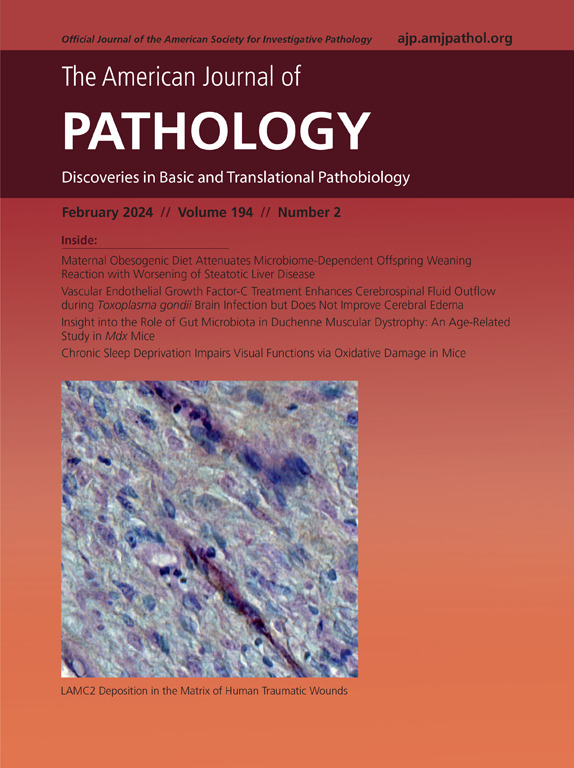Segmental Regulation of Intestinal Motility by Colitis and the Adaptive Immune System in the Mouse Ileum and Colon
IF 4.7
2区 医学
Q1 PATHOLOGY
引用次数: 0
Abstract
Gastrointestinal motility disturbances are a hallmark of inflammatory bowel disease (IBD); however, their mechanisms remain unclear. This study used a dextran sulfate sodium–induced colitis mouse model, deficient in mature B and T lymphocytes, to assess intestinal motility and the role of the adaptive immune system in health and IBD. In healthy mice, the absence of adaptive lymphocytes reduced acetylcholine (ACh) sensitivity in the ileum. During colitis, it decreases motility by reducing the intensity and frequency of spontaneous contractions while increasing cholinergic responsiveness. In the proximal colon, adaptive immunity deficiency led to increased contractility and reduced ACh sensitivity in homeostasis, whereas colitis reduced contractile capacity. In the mid colon, immune-deficient mice had reduced ACh sensitivity in homeostasis and exacerbated contractile responses during colitis. In the distal colon, adaptive immunity loss reduced contractility in health and cholinergic responsiveness during colitis. These motility alterations were associated with altered acetylcholinesterase and M2/M3 muscarinic receptor expression. Notably, adaptive lymphocyte deficiency resulted in reduced tissue damage and lower tumor necrosis factor-α expression in the colon during colitis, paralleling intestinal motility changes. Overall, the adaptive immune system critically regulates motility and inflammation across different intestinal segments in IBD.

小鼠回肠和结肠中结肠炎和适应性免疫系统对肠蠕动的节段性调控
胃肠道运动障碍是炎症性肠病(IBD)的一个特征;然而,其机制仍不清楚。本研究利用缺乏成熟 B 淋巴细胞和 T 淋巴细胞的右旋糖酐硫酸钠(DSS)诱导结肠炎小鼠模型来评估肠道运动以及适应性免疫系统在健康和 IBD 中的作用。在健康小鼠中,适应性淋巴细胞的缺失会降低回肠对乙酰胆碱(ACh)的敏感性。在结肠炎期间,适应性淋巴细胞会降低自发收缩的强度和频率,同时增加胆碱能反应性,从而降低运动能力。在近端结肠,适应性免疫缺陷导致收缩力增加,ACh 敏感性在平衡状态下降低,而结肠炎则会降低收缩能力。在结肠中部,免疫缺陷小鼠在平衡状态下对 ACh 的敏感性降低,而在结肠炎时收缩反应加剧。在结肠远端,适应性免疫丧失降低了健康时的收缩能力和结肠炎时的胆碱能反应能力。这些运动能力的改变与乙酰胆碱酯酶和 M2/M3 毒蕈碱受体表达的改变有关。值得注意的是,在结肠炎期间,适应性淋巴细胞缺乏会导致结肠组织损伤减少,TNF-α表达降低,与肠道运动变化同步。总之,适应性免疫系统对 IBD 不同肠段的运动和炎症起着关键性的调节作用。
本文章由计算机程序翻译,如有差异,请以英文原文为准。
求助全文
约1分钟内获得全文
求助全文
来源期刊
CiteScore
11.40
自引率
0.00%
发文量
178
审稿时长
30 days
期刊介绍:
The American Journal of Pathology, official journal of the American Society for Investigative Pathology, published by Elsevier, Inc., seeks high-quality original research reports, reviews, and commentaries related to the molecular and cellular basis of disease. The editors will consider basic, translational, and clinical investigations that directly address mechanisms of pathogenesis or provide a foundation for future mechanistic inquiries. Examples of such foundational investigations include data mining, identification of biomarkers, molecular pathology, and discovery research. Foundational studies that incorporate deep learning and artificial intelligence are also welcome. High priority is given to studies of human disease and relevant experimental models using molecular, cellular, and organismal approaches.

 求助内容:
求助内容: 应助结果提醒方式:
应助结果提醒方式:


